How to Become More Communicative
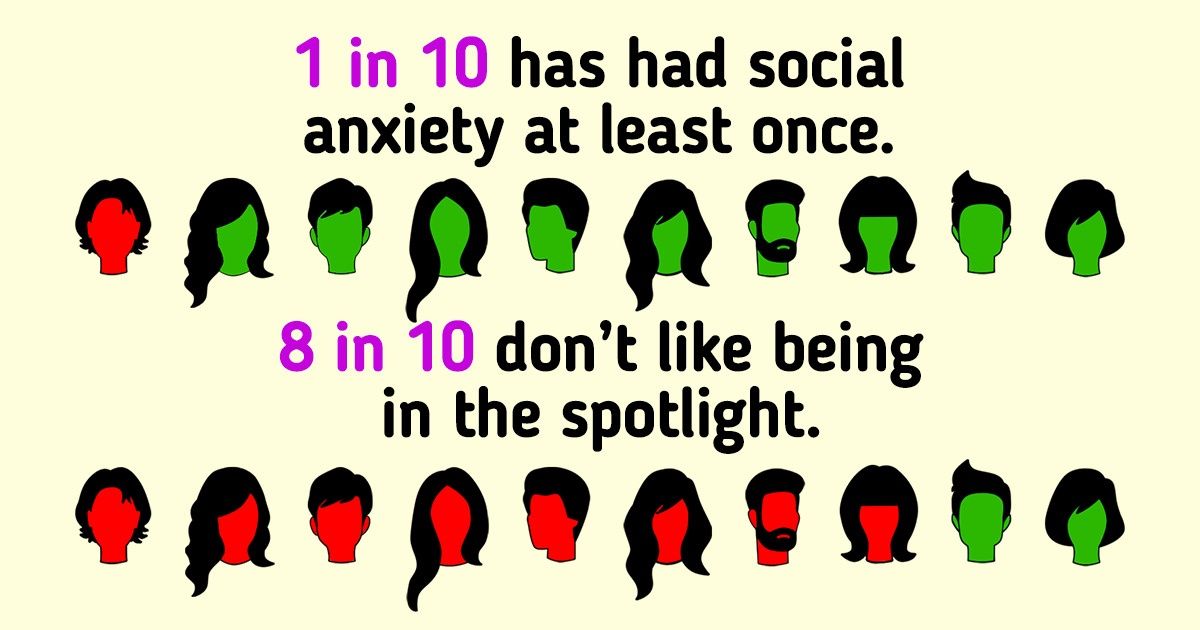
Sometimes, we have to fight with ourselves to start even a small conversation with someone. And if you want to talk and get to know someone better, you need a lot of communicative skills to keep the person interested. In his work, “How many hours does it take to make a friend?” Jeffrey A. Hall from Kansas University found that people need a certain amount of time to become close: 50 hours for people to become comfortable around each other, 90 hours to form a friendship, and 200 hours to develop a great friendship.
5-Minute Crafts is going to help you become more communicative with a few simple steps.
1. You’re not alone in your insecurity.
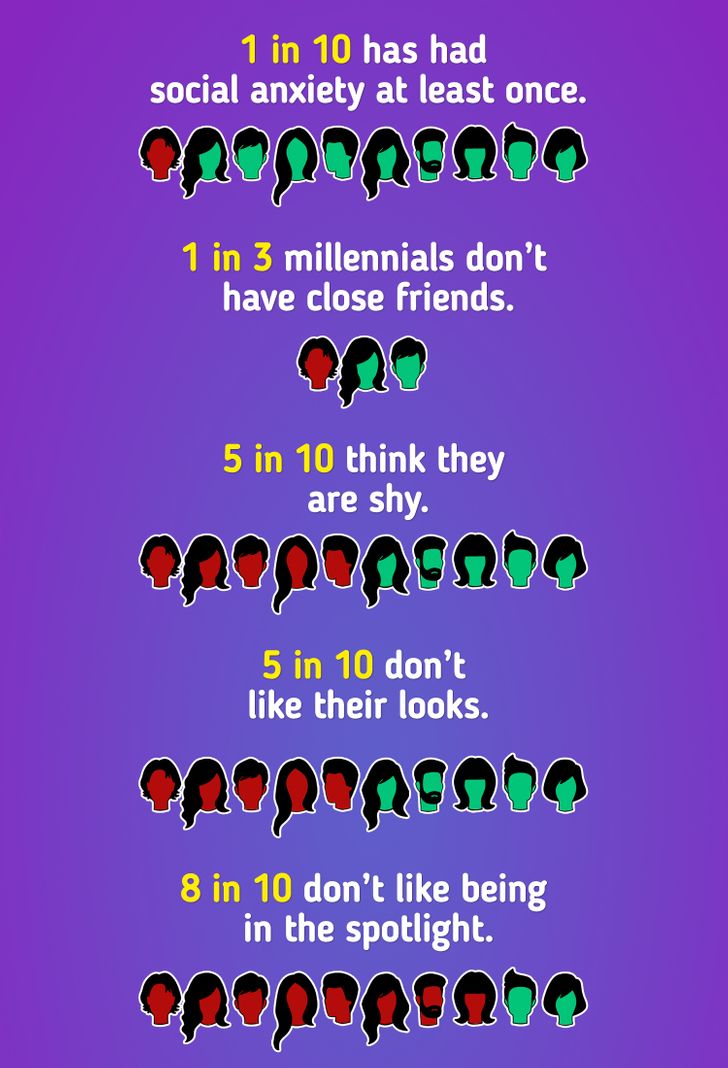
You may assume that everyone is looking at you the second you enter a room, or you feel that everyone can see that you’re nervous and awkward. In fact, we are inclined to overestimate the attention other people give us. If you understand this fact, you will become more confident. There’s no need to worry about what others think about us.
Scientists call this the spotlight effect: people think that they are different and everyone is looking at them. But it’s not true. Everyone is actually thinking about themselves and what others think about them.
It turns out that many people share your insecurity:
? 1 in 10 people has had social anxiety at least once.
? 1 in 3 millennials doesn’t have close friends.
? 5 in 10 people think they’re shy.
? 5 in 10 people don’t like their looks. Only 4% of women think that they’re attractive.
? 8 in 10 people don’t like being in the spotlight.
We often think that we feel more nervous than others. The problem is we make judgments about people based on their behavior and appearance. If a person looks calm, we think that they are relaxed. But we can’t really know how they feel.
Every time you enter a room, remind yourself that most people hide their insecurities, and try to look calm. Many of them are feeling socially anxious. This might help you relax a little bit.
2. Give people your attention.

Start with small steps in building relationships with other people — strangers, neighbors, colleagues, and friends. It might be eye contact or a friendly gesture, like a compliment or a “thank you.” Smile — it’s contagious.
If someone is looking right at you when you’re shopping at a grocery store, going on the subway, or sitting in a break room at work, smile at them. Most people react positively to this and will probably return it.
In a situation like this, you can make one more step and greet a person, start a conversation by asking for advice, or give a compliment. The more often you do this, the more secure you will be in talking to the people you want to talk to.
3. Start a conversation with something pleasant.

Have you ever arrived at a party in a bad mood because someone forced you to go there or something bad happened on the way? Don’t let your mood affect your communication with people. When you start a conversation with something negative or mention something stressful, you’re setting the tone for the entire conversation.
To show you the difference in how people will perceive different emotions, here are 3 situations. Servers bring breakfast to hotel rooms without windows. The hotel guests don’t know what the weather is like outside. There are 3 different scenarios. Which of them do you think makes the best impression?
? Server #1 will dryly greet the guest by saying, “Good morning. Here’s your breakfast.”
? Server #2 happily says, “Good morning! Here’s your breakfast! Looks like the weather’s going to be great today.”
? Server #3 says cheerlessly, “Good morning. Here’s your breakfast. Looks like the weather’s going to be terrible today.”
As a result, sever #2, who gave the best news at the beginning of the conversation, will get a bigger tip because they set a nice tone for the conversation.
It doesn’t matter who you’re interacting with, always start with something positive. Before you start talking, think about 3 good things you can mention right away. It will instantly make you someone nice to talk to.
4. Choose a conversation topic.
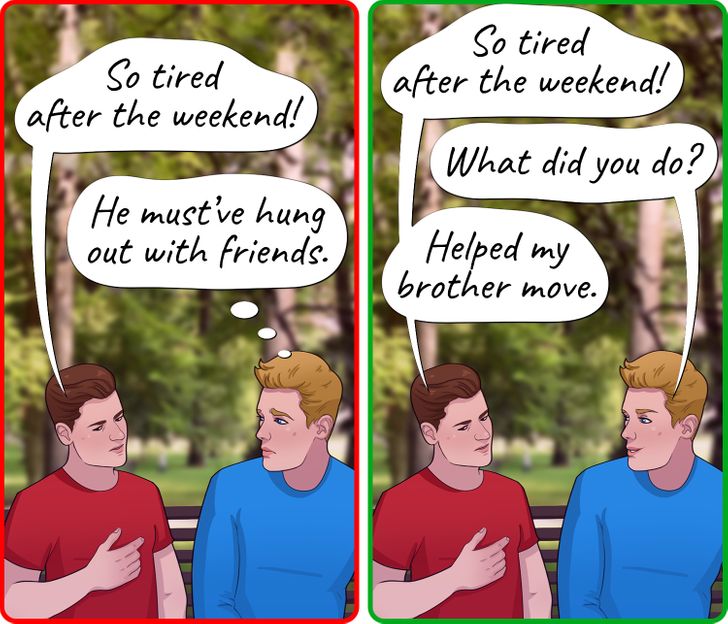
You might have zero ideas on what to talk about. Or you might have so many ideas that you don’t know which to choose.
Try showing interest and curiosity about the person you’re talking to.
Imagine you want to start a conversation with a colleague. You say, “Hi, how are you?” And they say, “It’s great, we went out of town yesterday, so I’m a little tired today.” If you often overanalyze things, you might think, “This guy must be way more communicative than I am. He will soon realize I’m not like that. And he seems to have a lot of friends, more than I do. What do I say? I don’t want to look like a loser.”
Such a negative internal conversation won’t help you become more communicative. Instead of worrying about how you speak or what others think about you, focus on getting to know the person better. When you do that, your brain will make up new questions to keep the conversation alive. You will be more communicative. This is what you can ask your colleague:
? “Why did you go out of town? Was it a special occasion or did you just want to get some rest?”
? “Who did you go with? Friends, family, or colleagues?”
? “What did you do there? How did you spend your time?”
You will have a lot of ideas about what to talk about once you stop comparing yourself to other people. You will get naturally curious and the questions will appear on their own. Remember what happens when you get interested in a film. You start asking questions like, “Why did she do that?” or “Where did he get the letter?”
5. Reduce self-control.
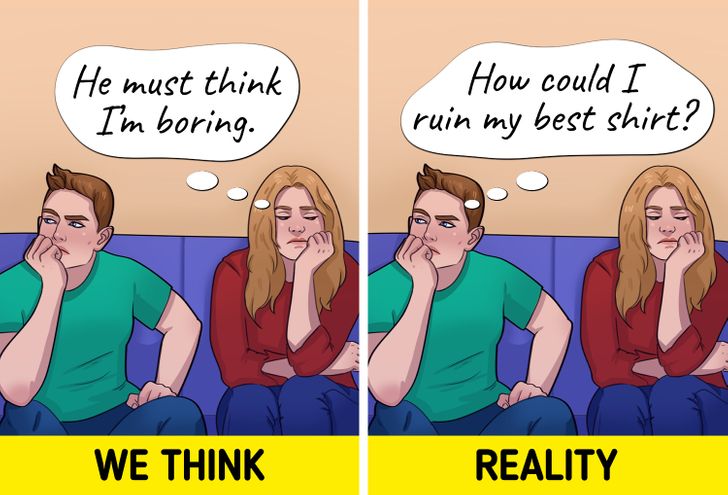
Disable self-censorship. People are less inclined to judge others than we think. They have their own problems. Just enjoy communication without doubting everything you’re going to say.
Try meditating. This might seem illogical since it’s something that isolates you even more. But, in fact, it helps you clear your mind. Sit down, set a timer for 15 minutes, close your eyes, and breathe in with your belly, slowly. You may notice your brain having thoughts about things you haven’t thought about for years — this is normal.
Such practices can help you get rid of obsessive thoughts. It will help you be in the present moment when you are talking to other people instead of constantly filtering your thoughts.
6. Balance the conversation.
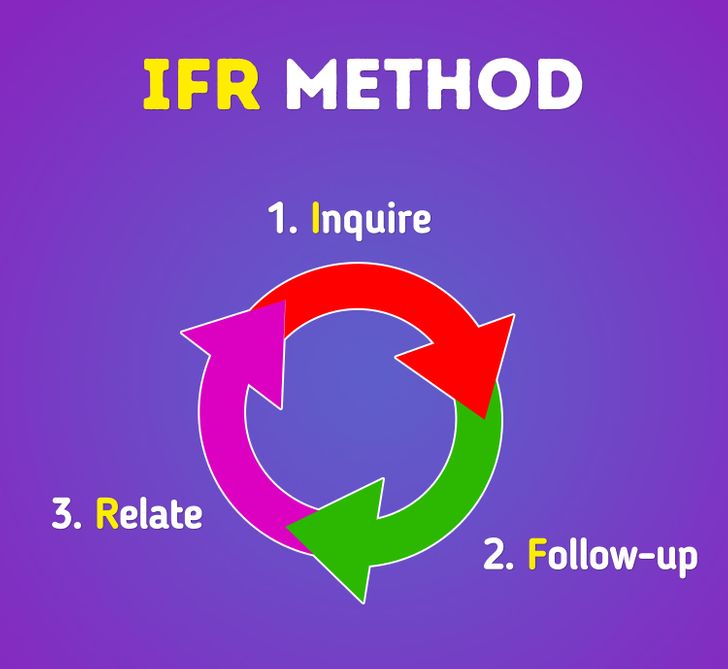
Aside from asking people questions, you should also share information about yourself. But you should keep things balanced. If you keep talking about yourself all the time, the person will get bored really quickly. At the same time, too many questions will make the person feel as if they are being interrogated.
To keep things balanced, use the IFR method:
1. Inquire
2. Follow-up
3. Relate
For example:
1. Inquire
? “What are your plans for tonight?”
? “I think I’m going to read.”
2. Follow-up:
? “What are you going to read?”
? “A new detective novel.”
3. Relate:
? — “I love detective stories. I have all the books about Nero Wolfe by Rex Stout.”
Now you can start the cycle again:
1. Inquire:
? “What do you like about detective stories so much?”
As long as you listen to what the other person says, your natural curiosity will help you come up with more and more questions. By using the IFR-IFR-IFR cycle, you will make the conversation more interesting, and you’ll get to know the person better and get to talk about yourself too.
7. Don’t avoid communication.
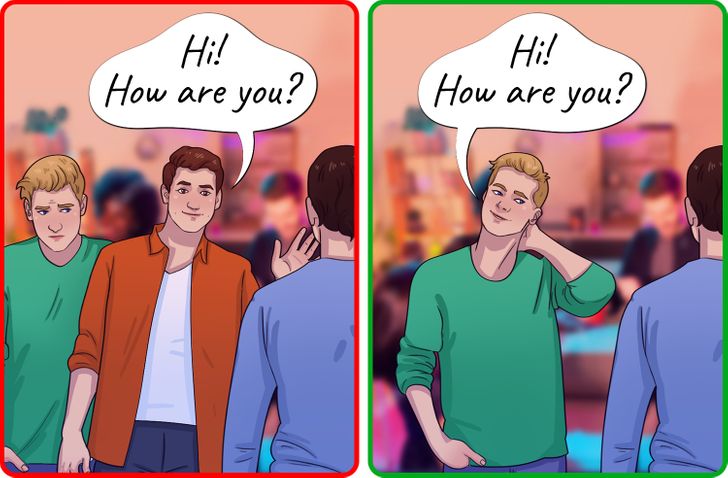
Avoidance behavior is what we do when we want to avoid discomfort. If you refuse to go to an event, this is definitely avoidance behavior. It doesn’t allow you to interact with other people.
Here are a few examples of avoidance behavior and ways not to act this way.
? Using your smartphone: Turn it off when you come to a meeting, put it in your pocket, and don’t use it until you leave.
? Going to events with someone who is more communicative than you are: Visit at least half of such events alone or with someone who will help you talk to other people.
? Avoiding groups of people and trying to be alone: Challenge yourself and talk to at least 5 people before you leave.
Of course, people behave this way because they’re scared. Start small. Don’t try to change yourself in one day. When you feel comfortable around other people, you won’t have to use avoidance behavior anymore.